Five talking points from the Tour of Flanders 2022
The key talking points from a thrilling day of racing in Flanders
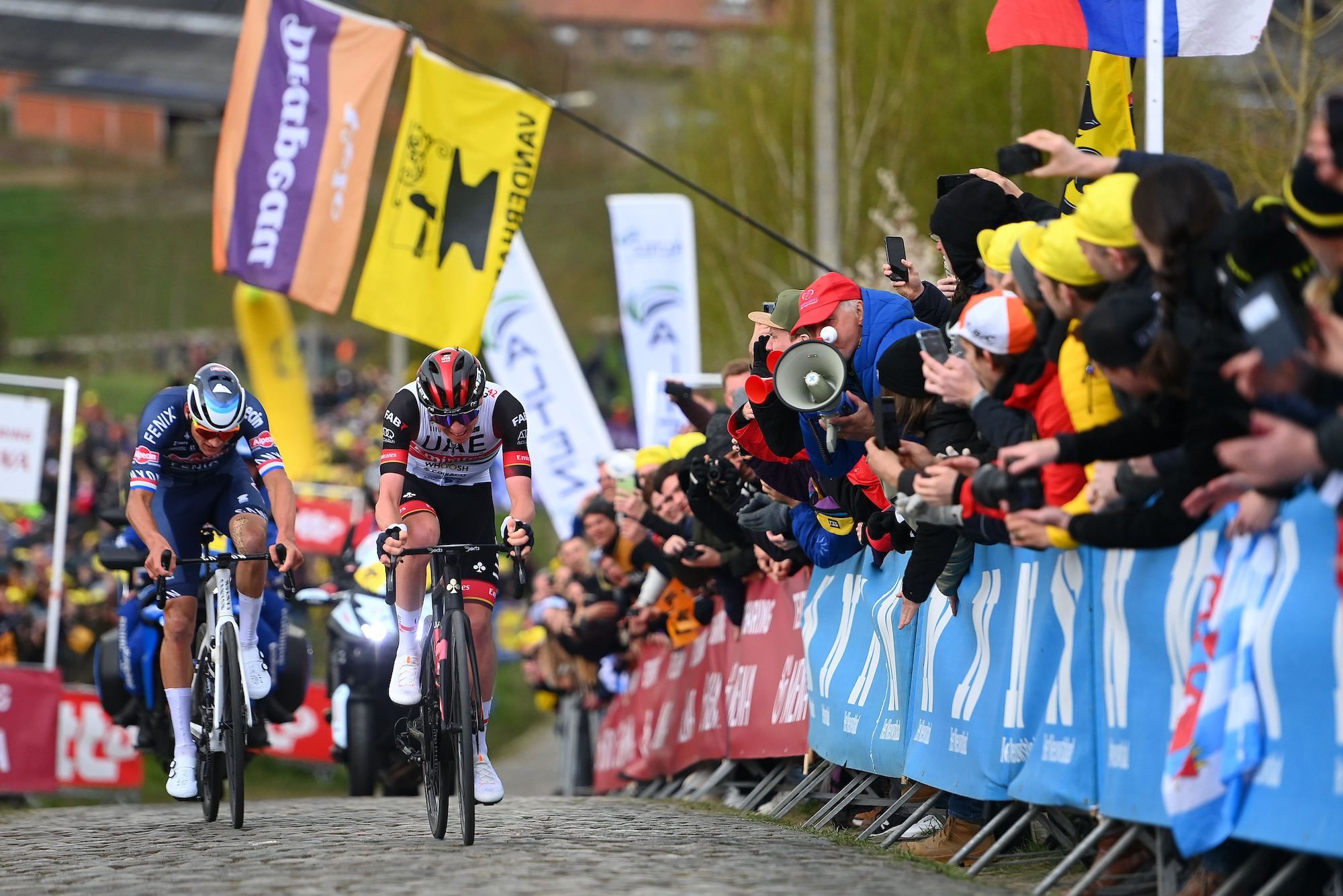
VAN DER POEL TRIUMPHANT AFTER DARING GAME OF POKER
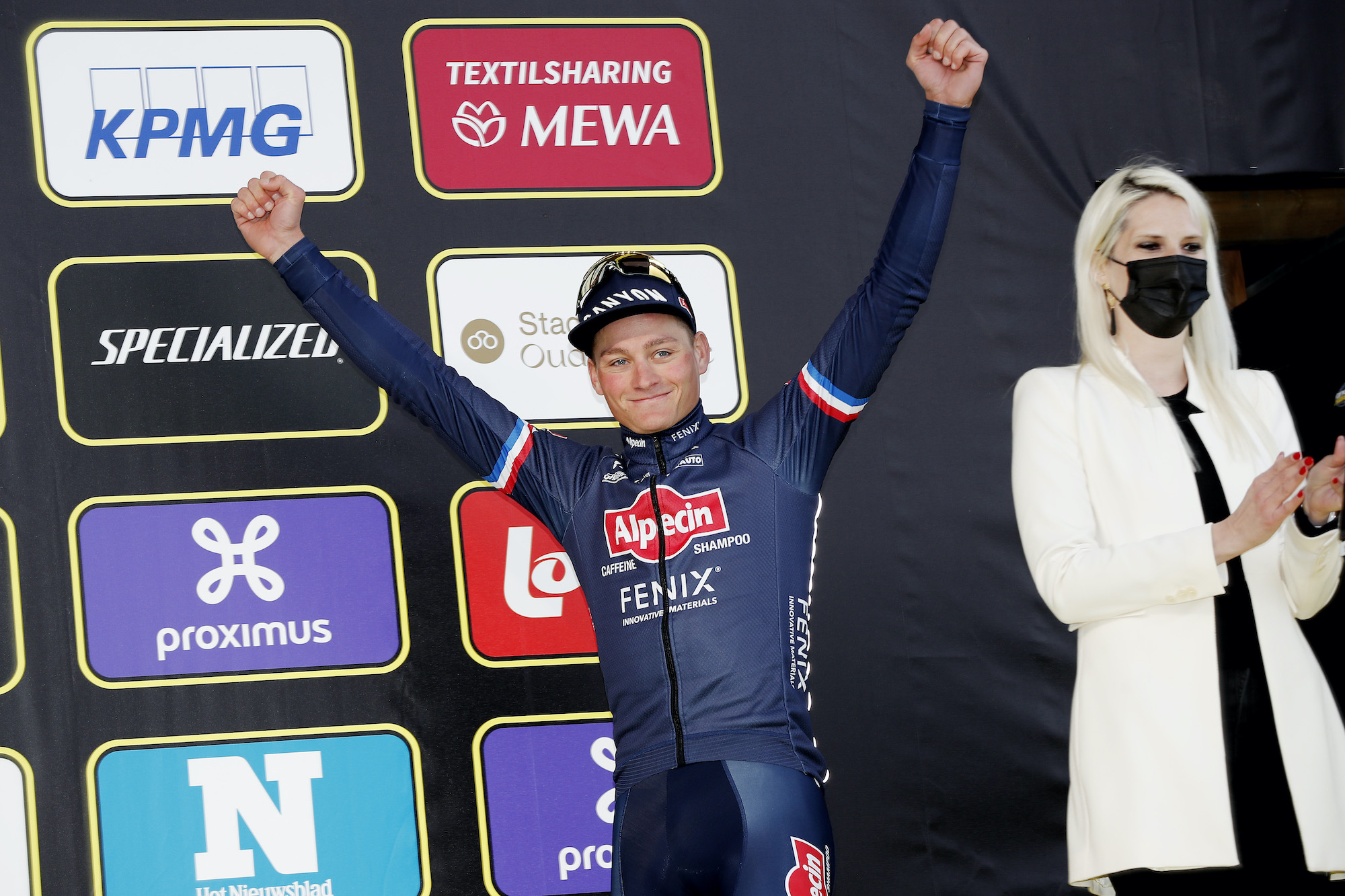
Heading into the final moments of the men’s 2022 men’s Tour of Flanders, there was a strong sense of deja vu. For the third year in succession Mathieu van der Poel (Alpecin-Fenix) arrived into the finishing straight with one other rider, this time Tadej Pogačar (UAE Team Emirates), the race appearing set to be decided by another two-up sprint.
What happened next, however, was neither familiar nor in any way expected. Forced to lead-out the sprint after Pogačar declined to take his turn as they entered the final kilometre, Van der Poel slowed dramatically, not wanting to give Pogačar a fast run-in to the line to launch his sprint.
As they reduced their speed almost to a track stand, a chasing duo of Dylan van Baarle (Ineos Grenadiers) and Valentin Madouas (Groupama-FDJ) bore down on them at an alarming rate, yet Van der Poel still did not speed up, daring Pogačar to make his move first or risk being caught by the chasers, who himself called his bluff and neglected to up the pace.
It appeared to be a gamble, but turned out to be a masterpiece of daring, composure and timing from Van der Poel, who began his sprint just as the Madouas and Van Baarle were on their wheel, and managed to outkick them despite starting from such a slower pace.
It was a gamble that may well have been necessary, as Van der Poel was in no way guaranteed to defeat Pogačar — himself a very fast finisher — in a sprint. And the Dutchman would have been dreading a repeat of last year, when to the surprise of everyone Kasper Asgreen (Quick-Step Alpha Vinyl) beat him in a similar sprint finish.
Van der Poel was also exhausted, having had to dig extremely deep to stay with Pogačar up to this point. It looked like he was about to be dropped on the Paterberg, when he lost the wheel of the Slovenian, but in a dramatic moment in which he appeared to summon from the depths his very last resources of strength, he forced himself to close the gap, and the pair made it to the top together — just.
That effort was worth it, as it set Van der Poel up to take what is his second career Monument, following his first Tour of Flanders win two years ago. Having finished first, second and first successively in the last three editions, he’s becoming the face of the Tour of Flanders, and this was a typically dramatic ride from a rider who exudes panache.
The latest race content, interviews, features, reviews and expert buying guides, direct to your inbox!
KOPECKY DELIVERS BELGIAN DELIGHT WITH HOME VICTORY
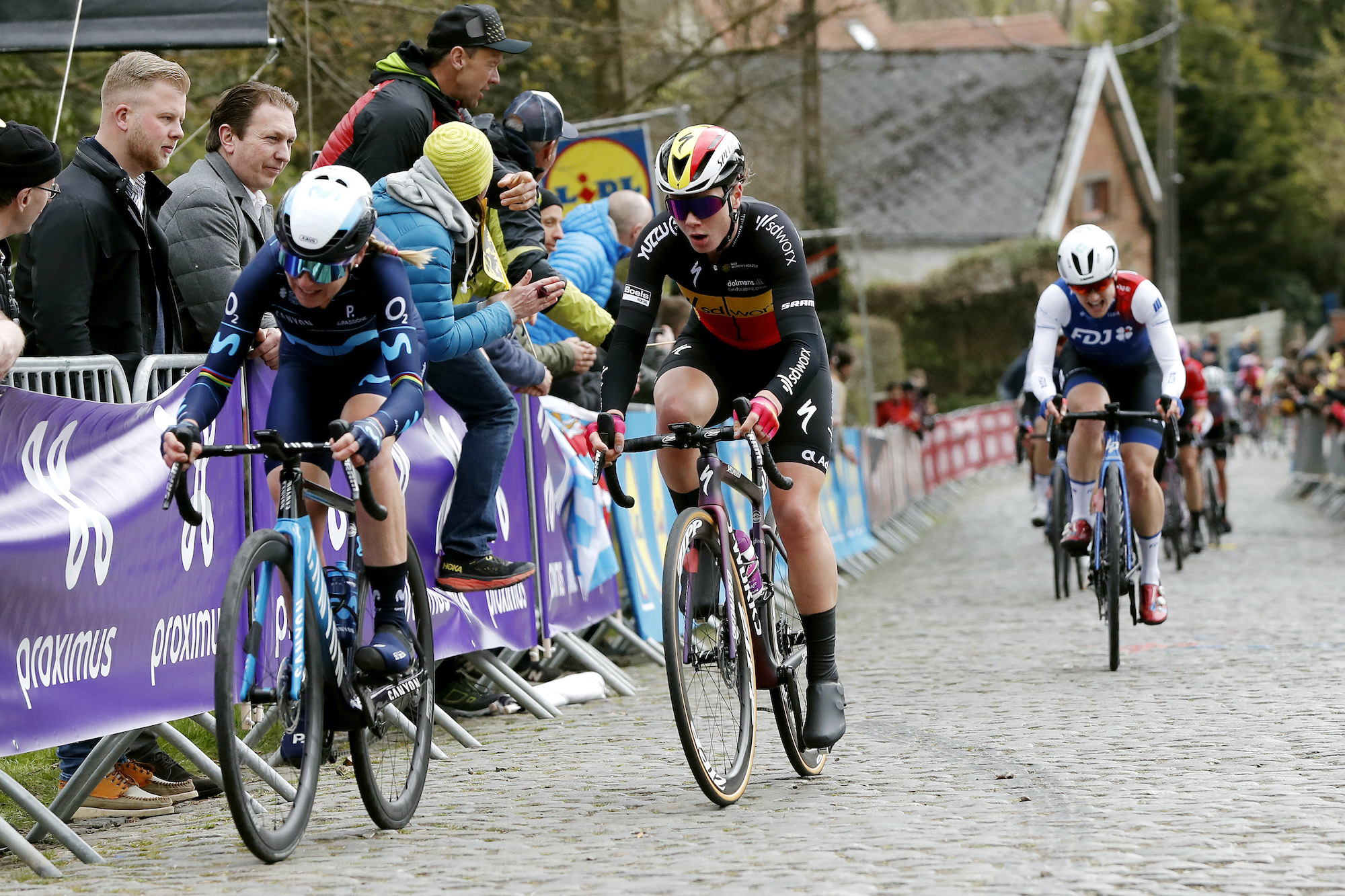
Wearing the Belgian national champion jersey in front of thousands of cheering local fans on the roadside in what is the nation’s biggest race, this was a date with destiny for Lotte Kopecky (SD Worx). It’s not often you get to near your national colours while at the peak of your powers, with a team of some of the world’s best riders to back you up, and so Kopecky would not have wanted to miss out on the opportunity.
If she was nervous, she didn’t show it, and had no problem coming around Annemiek van Vleuten’s wheel in the finishing sprint after team-mate Chantal van den Broek-Blaak had led her out.
This race was a continuation of the rivalry between the two that had first played out earlier this spring at Strade Bianche. Victory here made it 2-0 to the Belgian, but whereas that success was more of a surprise given the uphill finish to Siena, here Kopecky was always the favourite in a flat sprint finish, especially with Van den Broeck-Blaak accompanying her in the three-woman lead group that went clear shortly after the Paterberg, 10km from the finish.
The pivotal tests had occurred earlier on in the race over the day’s many deadly climbs, and on each one Kopecky passed with flying colours, staying glued to Van Vleuten’s wheel on every one and never letting her out of her sight.
Having threatened to do so for a few seasons, Kopecky is now winning major classics, and in rapid succession too with today’s victory coming just a month after Strade Bianche. She’s fully delivering on her potential, and is undoubtedly now one of the best one-day racers — if not the best — in the world.
POGAČAR SUBLIME AGAIN, BUT FLUFFS FINALE
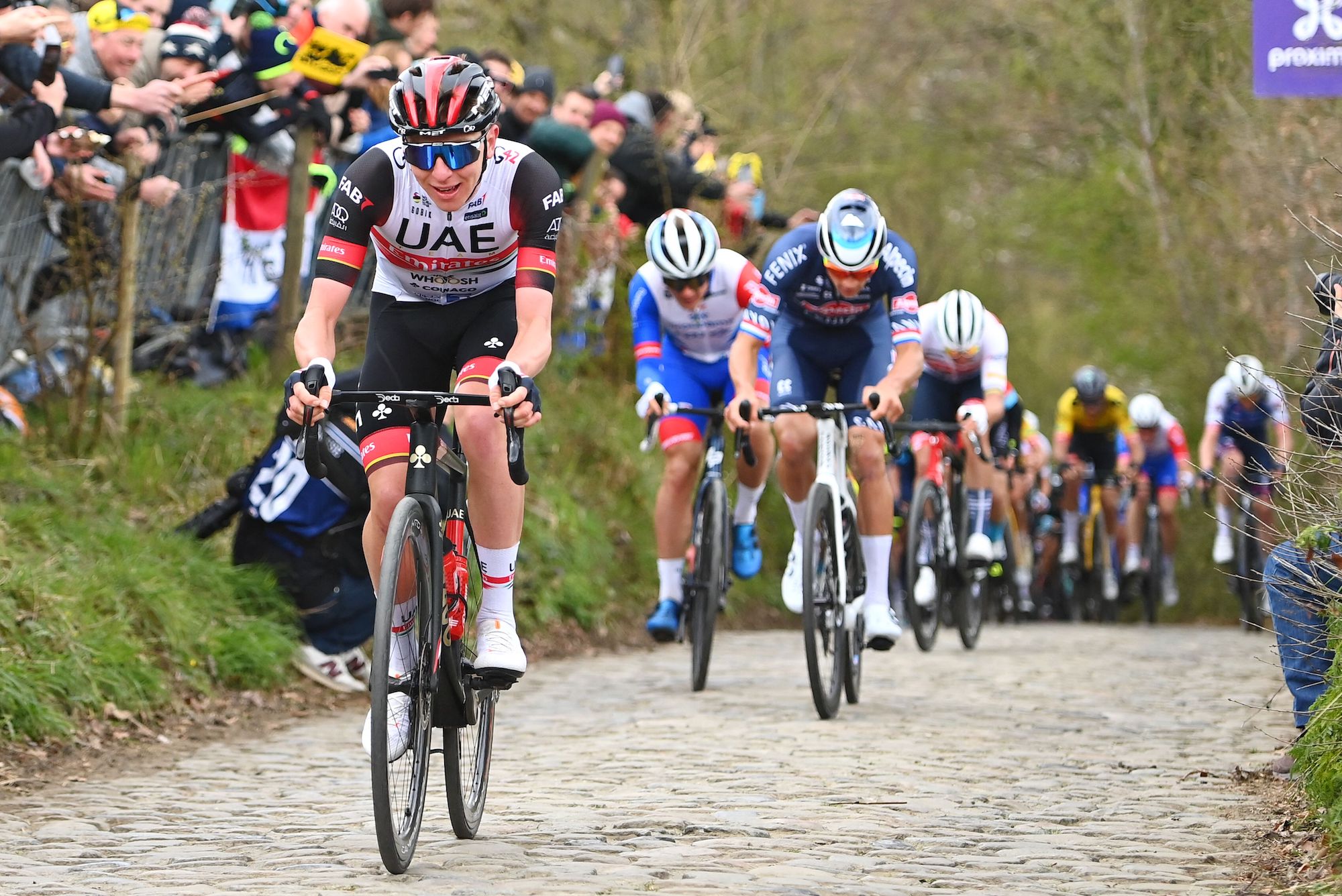
On one hand, this was yet another jaw-dropping performance from Pogačar. Dispelling any doubts that he didn’t have the experience to compete on the cobbles on what was his debut Tour of Flanders, he was the strongest man on the day, shaping the way the whole race unfolded.
When it looked like he and the UAE Team Emirates had been put on the back-foot by not placing a rider in a dangerous-looking group that went clear 90km from the finish (featuring, among others, two Jumbo-Visma riders, two Quick-Step Alpha Vinyl riders and two Trek-Segafredo riders, plus Ben Turner from Ineos Grenadiers, Nathan Van Hooydonck from Jumbo-Visma, Gianni Vermeersch from Alpecin-Fenix and EF Education-EasyPost’s former winner Alberto Bettiol), Pogačar neutralised the move himself with a lethal acceleration on the second ascent of the Oude Kwaremont.
He then forced the main selection way out from the finish on the Koppenberg with another acceleration that only Van der Poel and Valentin Madouas (Groupama-FDJ) could follow, and set a searing pace again up the final time up the Oude Kwaremont to drop Madouas (and Fred Wright (Bahrain-Victorious) and Dylan van Baarle (Ineos Grenadiers), who by then they’d caught from an earlier break).
Cycling simply hasn't witnessed anyone like this for decades, a multiple Tour de France winner who not only can win the hilly Monuments, but even looks the strongest rider on the hardest of cobbled Belgian Classics. You’d never have seen Chris Froome, Alberto Contador, Lance Armstrong or Miguel Indurain do that.
But on the other hand, the finale showed him flustered in a way we’ve never seen him before. Usually such a cool head and unassuming character, he was visibly upset at how the finish panned out, throwing his arms up in frustration in an apparent accusation towards the others for blocking him.
Despite being the strongest rider throughout the day, he had somehow missed the podium, coming fourth in a two-up sprint.
Losing in this way is not something he’s used to — in fact, losing in any way is something he has little experience of — and the way this race finished takes some shine off his invincible sheen.
In Van der Poel, Pogačar he has found a worthy adversary, and it’d be great to see them compete head-to-head more. Pogačar’s comments after the race, expressing how much he loved the race, suggests he’ll be back, and we could see a continuation of their mouth-watering rivalry in the future.
SD WORX REASSERT THEMSELVES AGAINST TREK-SEGAFREDO AS THE PELOTON'S BEST
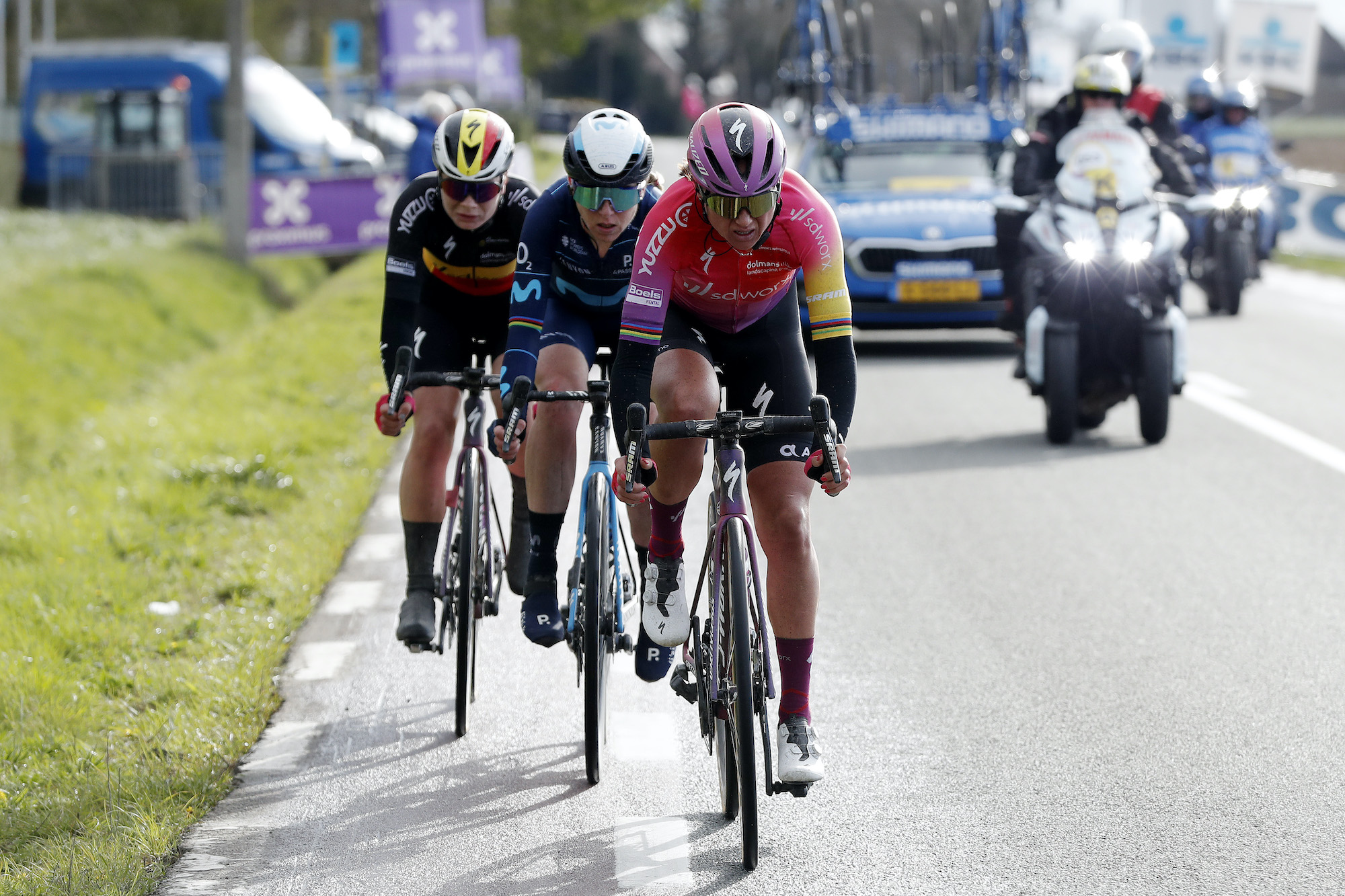
Keeping a race as hard as the Tour of Flanders together for a sprint finish was always going to be a huge ask, and Trek-Segafredo ultimately crumbled in their attempts to do so.
Having survived the climbs in each of Trofeo Alfredo Binda, Classic Brugge-De Panne and Gent Wevelgem to take a hat-trick of Classic wins ahead of this race, world champion Elisa Balsamo at last found her undoing at the Ronde, struggling to keep up on the Koppenberg, and then being dropped out of contention on the climbs after that.
Trek-Segafredo failed to fall back on a plan B as each of Elisa Longo Borghini and Ellen van Dijk looked short of their best, and didn’t even place a rider in the top 25.
Instead, the race was a reassertion of dominance from the SD Worx team, who had found their status as the peloton’s patrons under threat.
This was a vintage performance from the team, a mixture of tactical brains and sheer strength of their individual riders that they’ve made their trademark. They had Christine Majerus in an early dangerous break that forced Trek-Segafredo to chase, then, when that group was brought back, unleashed Marlen Reusser and Chantal van den Broeck-Blaak to pile the pressure on with multiple attacks, allowing Kopecky to focus on the sole task of sticking to Van Vleuten’s wheel.
With Van den Broeck-Blaak finishing third, and Reusser sprinting just behind Arlenis Sierra (Movistar) to take fifth, this was every bit as good as their best performances during the Anna van der Breggen era, and proof that the team are still as formidable as ever.
VAN BAARLE AND MADOUAS PODIUM AS JUMBO-VISMA AND QUICK-STEP ALPHA VINYL FLOUNDER
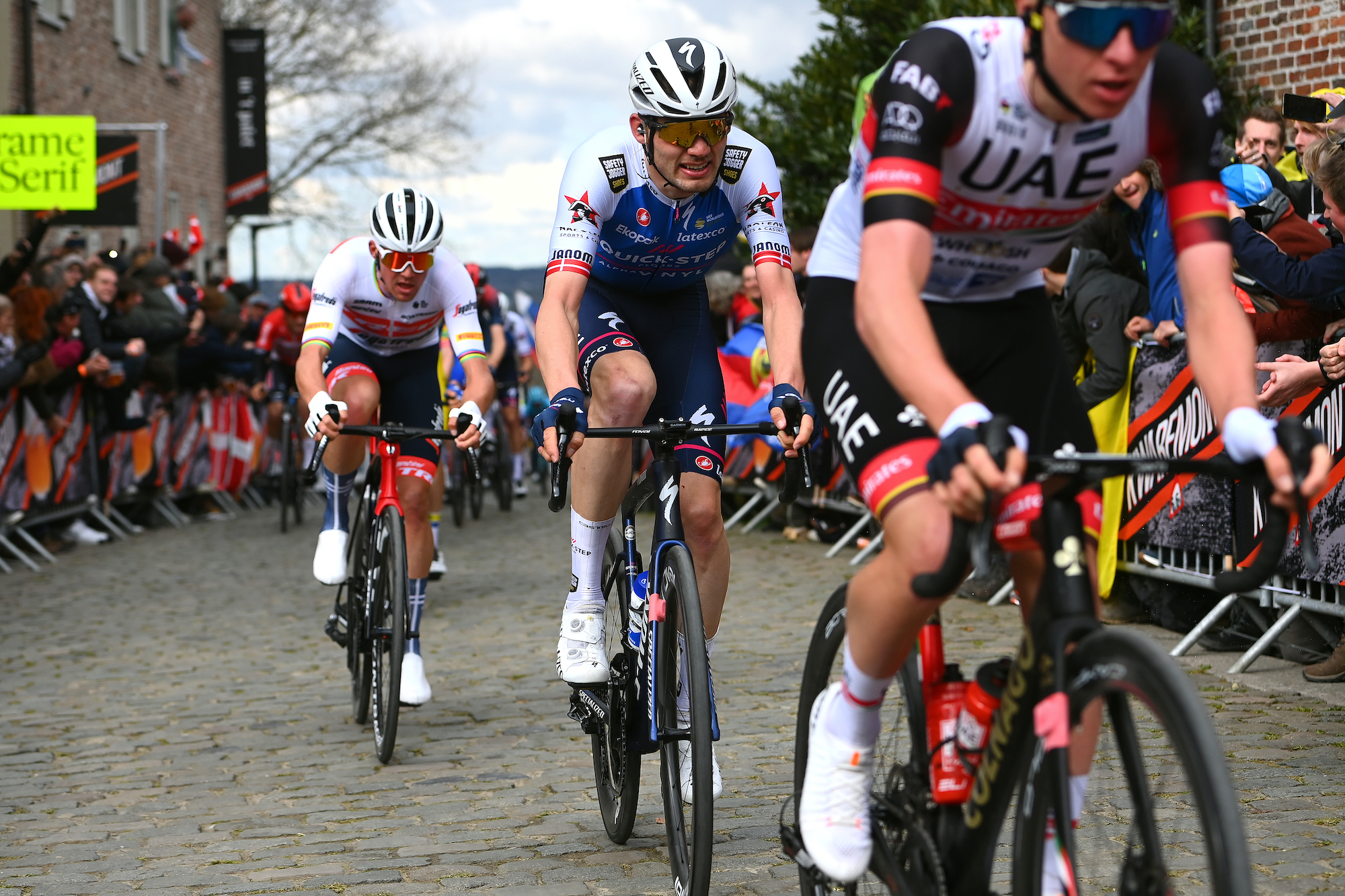
Having dominated the cobbled Classics season up until now, Jumbo-Visma fell apart on the one that really mattered, with their riders unable to compensate for Wout van Aert’s Covid-enforced absence.
Their bad luck from that badly timed illness continued when Christophe Laporte went down in a painful-looking crash about 80km from the finish, which may have been the reason why he lacked legs in the back end of the race, while Tiesj Benoot faded in the finale to place 12th, three places behind Laporte in ninth.
It was also another gruelling day for Quick-Step Alpha Vinyl, whose spring goes from bad to worse. Proceedings started off promisingly, as they got Zdeněk Štybar and Jannik Steimle into a strong tactical break 90km from the finish, but fell apart on the Koppenberg, where leader Kasper Asgreen suffered a decisive mechanical, and their other riders fell away. The Dane was their highest finisher, way down in 23rd.
Instead, this was a great day for Ineos Grenadiers and Groupama-FDJ, who rounded off the podium with Dylan van Baarle and Valentin Madouas respectively. Tom Pidcock might not have been at his best for the former, but Van Baarle certainly was, giving himself a head start by smartly slipping clear along with a revelatory Fred Wright (Bahrain-Victorious) just after the first ascent of the Paterberg about 50km from the finish, and later storming back on the finishing straight to take second-place — his highest Flanders finish to date, and a repeat of the silver medal he claimed at the Flemish world championships last season.
A podium for Valentin Madouas also completed a terrific day for Groupama-FDJ, who also took fifth with Stefan Küng, while Cecile Uttrup Ludwig, Grace Brown and Bodie Chapman all finished in the main chasing group of the women’s race to make the top ten.
And despite their leader Matej Mohorič being off the race, Bahrain-Victorious were also mightily impressive, with young Brit Fred Wright the pick of their three top 12th finishers. Aged just 22, are we looking at a future British winner of the Ronde?
Stephen Puddicombe is a freelance journalist for Cycling Weekly, who regularly contributes to our World Tour racing coverage with race reports, news stories, interviews and features. Outside of cycling, he also enjoys writing about film and TV - but you won't find much of that content embedded into his CW articles.